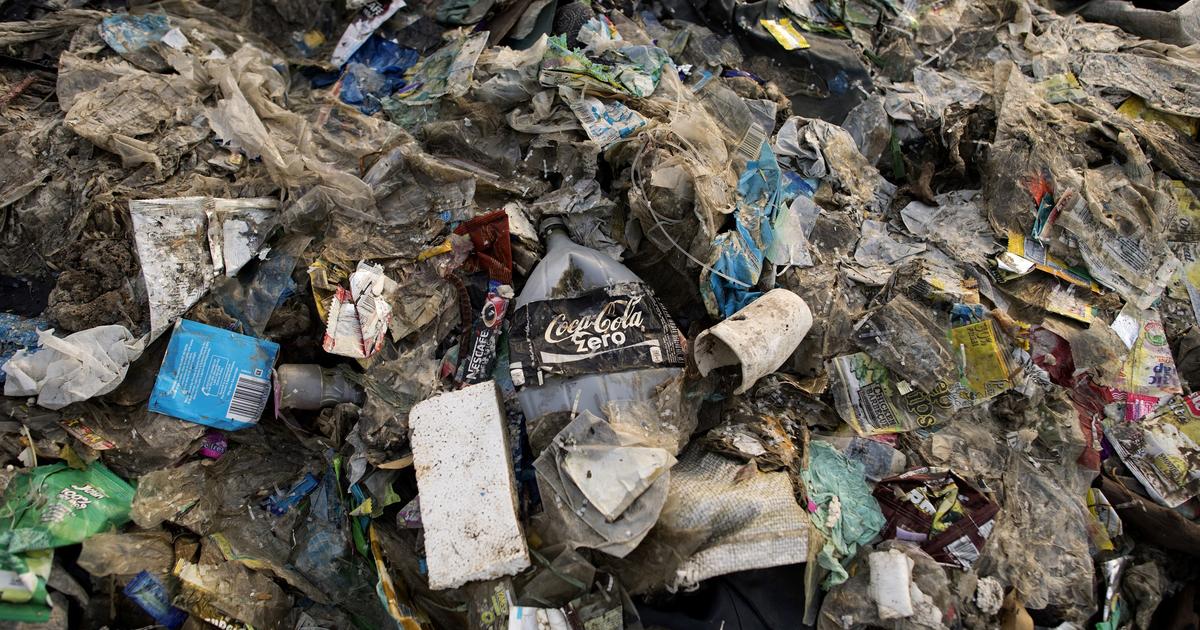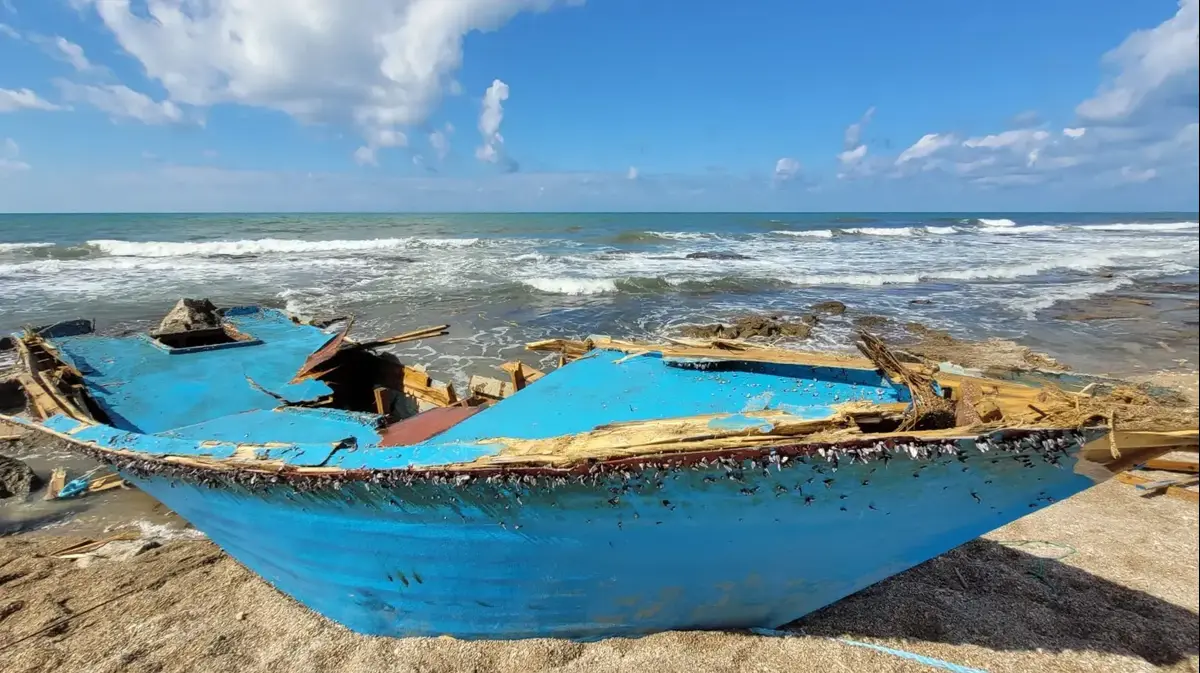- Click to share on Facebook (Opens in a new window)
- Click to share on Twitter (Opens in a new window)
- Click to share on LinkedIn (Opens in a new window)
- Click to email a friend (Opens in a new window)
Gigantic ocean pollution area discovered 3:42
London (CNN) - All the defining images of the coronavirus pandemic seem to present one thing: plastic.
Surgical masks, gloves, protective gear, body bags: The Covid-19 crisis has sparked a rapid expansion in the production of desperately needed plastic items, with governments vying to increase their stocks and regular citizens demanding their share of supplies.
Such production is necessary. But all that plastic ends up somewhere, and environmental activists fear it is just the tip of an oncoming iceberg, and that the pandemic will cause a series of serious challenges to its efforts to reduce plastic pollution.
- Restrictions imposed by the coronavirus pandemic continue to relax after a weekend of recreation and protests across the United States
From people disposing of plastic gloves and masks in cities around the world to important regulations on the use of plastic that is discarded, rolled or delayed, the problem has been in the background during one of the most important public health crises of the times modern.
The implications of those trends could spell years of trouble for our already polluted oceans.
"We know that plastic pollution is a global problem: it existed before the pandemic," Nick Mallos of the US NGO Ocean Conservancy told CNN. “(But) we have seen many industry efforts to reverse some of the great strides that have been made. We have to be very cautious about where we are going, after the pandemic, "adds Mallos.
Personal protective equipment adds to plastic cargo from the oceans
The coronavirus crisis has sparked an arms race for personal protective equipment (PPE) around the world as governments rush to accumulate masks, gloves, visors, and gowns. The battle has proved so intense that some have resorted to international confusion.
This occurs when an increasing number of countries encourage or direct their citizens to cover their faces in public, something that was once seen as a personal preference with minimal benefit, but is now the government-mandated guidance of various countries of the world.
And while the measures are important from a public health perspective, an immediate impact is clear on the streets around the world.
"Right outside my house there are discarded gloves and masks all over the neighborhood," says John Hocevar, ocean campaign manager at Greenpeace in the US.
- A floating device created to clean plastic from the Pacific Ocean is finally doing its job
Discarded masks and gloves have become commonplace in cities around the world.
“It has been raining here for two days, so these are quickly dumping into the sewer. Here in Washington they end up on the Anacostia River, in the Chesapeake Bay and then in the Atlantic Ocean. ”
PPE has become an additional threat to the world's oceans, which have drowned under the weight of plastic at an increasing rate.
Global plastic production has quadrupled in the past four decades, according to a 2019 study, with its authors warning that if that trend continues, plastics manufacturing will account for 15% of greenhouse gas emissions by 2050. In For comparison, modes of transport worldwide now account for 15% of emissions.
Other studies have estimated that about 8 million tons of plastic trash escape into the ocean annually, and the rate worsens each year.
But PPE presents very unique problems. "The EPP structure will make it particularly dangerous for marine life," says Hocevar. "Both gloves and plastic bags can look like jellyfish or other types of food for sea turtles, for example. Mask straps can present hazards like causing tangles. "
Over time, those products decompose and add to the vast collections of microplastics in our seas, air, and food. And the irony is that, while we produce and discard plastic to combat one public health crisis, we may be slowly contributing to another.
Why is the ocean overrun with plastics? 1:18The risks of microplastics to human health are still being studied. One stems from the fact that microplastics that pass through sewage plants can pick up harmful bacteria, which they can carry with them. If we ingest plastics, we can ingest bacteria.
Another is that plastics have a number of chemicals added at the manufacturing stage, and they may be released into the body.
"First of all, this is a time of public health and safety as the top priority," Mallos says. "But we also have to realize that the broader waste problem that is being highlighted by this pandemic really matters."
"We know that many places around the world do not have this capacity to manage this waste," he adds. "This is detrimental to human health and to the oceans and the environment."
There is little that can be done given the duration of this crisis to reduce the amount of plastic involved in fighting the coronavirus. But activists are waiting for changes to come.
"We are seeing some people experiment with disinfecting PPE now, but that is largely out of necessity, we just don't have enough," says Hocevar.
"In the longer term, we want to be a little bit more intentional about it and develop reusable and disinfectable PPE."
You could be consuming millions of microplastics every time you drink tea 0:26Legislative reversals
While EPP production causes a visible plastics problem on the streets and gutters of almost every major city, another is developing more quietly.
A number of restrictions on single-use plastics have been paused or reversed as authorities scramble to fight the crisis.
In the UK, a much-advertised fine on plastic bags was suspended. The ban on such items has been suspended in US states. USA like Maine, while retailers, including Starbucks, have banned reusable products to protect against the spread of covid-19.
The pattern has sparked concerns from organizations like the World Bank. "All of these measures have been announced as temporary, but how long will they last, fueled by anxiety over health problems?" Grzegorz Peszko, the organization's chief economist, asked in a blog post last month.
"When the covid-19 hits, it seems to be changing the trend towards single-use plastics," Peszko concluded.
Driving that concern is a sentiment among conservationists that the plastics industry is taking advantage of its time to capitalize on public health concerns by promoting the use of its products.
"Parts of the plastics industry have worked very hard to exploit fears around covid-19," says Hocevar.
"It is disappointing that lobby groups take advantage of this climate of fear and uncertainty," adds Mallos. "Using this opportunity to sell disposable plastics as the safe option is one of our challenges."
In March, the Plastics Industry Association wrote to the United States Department of Health asking it to "make a public statement about the observed health and safety benefits of single-use plastics."
The pandemic is "forcing many Americans, businesses and government officials to realize that single-use plastics are often the safest option," the group said.
Conservation groups criticized the studies cited by the body and have spoken of others suggesting that covid-19 lives longer in plastic than on most other surfaces. CNN has reached out to the Plastics Industry Association for comment.
Hocevar remains confident that the reversals will be temporary, noting that some progress has been made in his organization's cause even during the pandemic, citing new restrictions against single-use plastic in Orange County that was unveiled in April.
But Mallos fears that the daily rush of coronavirus developments will mean major setbacks that are going unnoticed.
"We are saturated daily with news about the pandemic ... there is so much information that is transmitted to us daily that many of these types of messages can be lost," he says. "It may not seem like a significant action at the moment, but it will manifest itself in a very dangerous way in the future."
- CNN's Mark Tutton contributed to this report.








